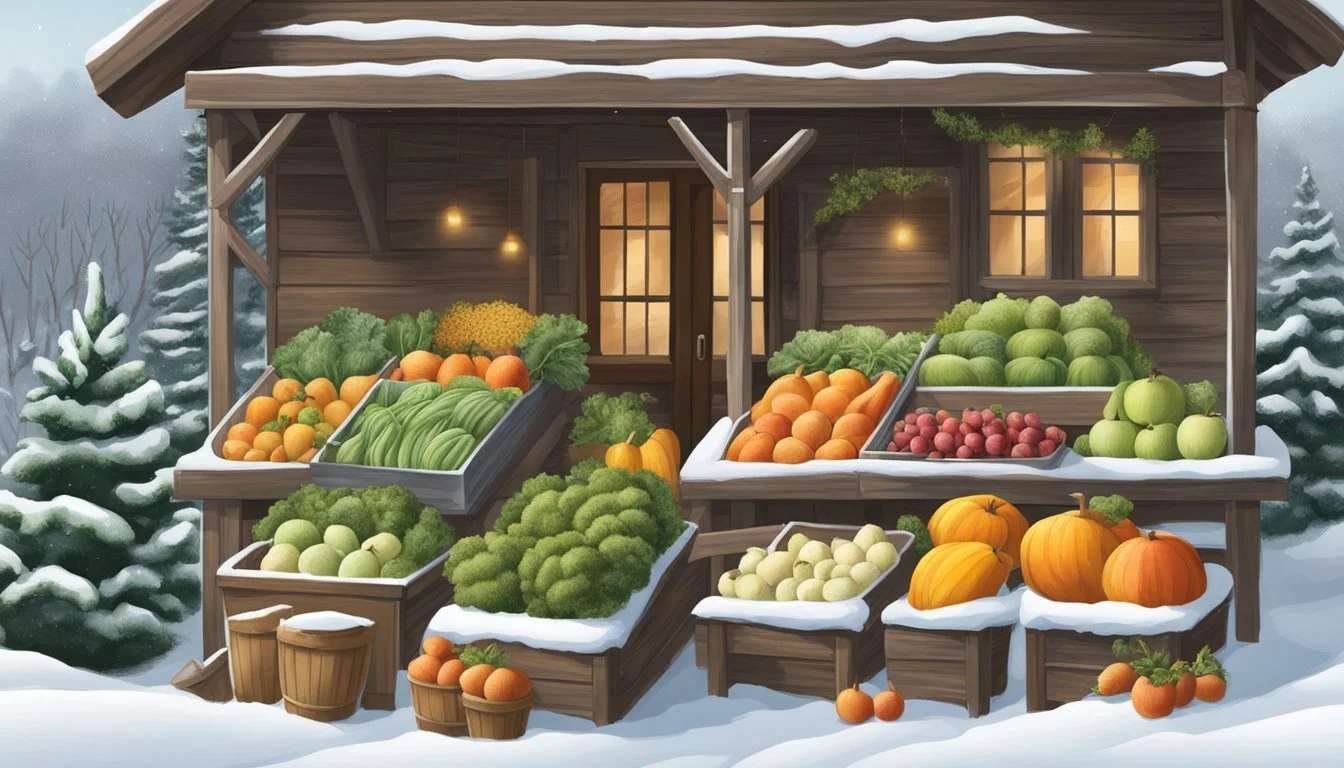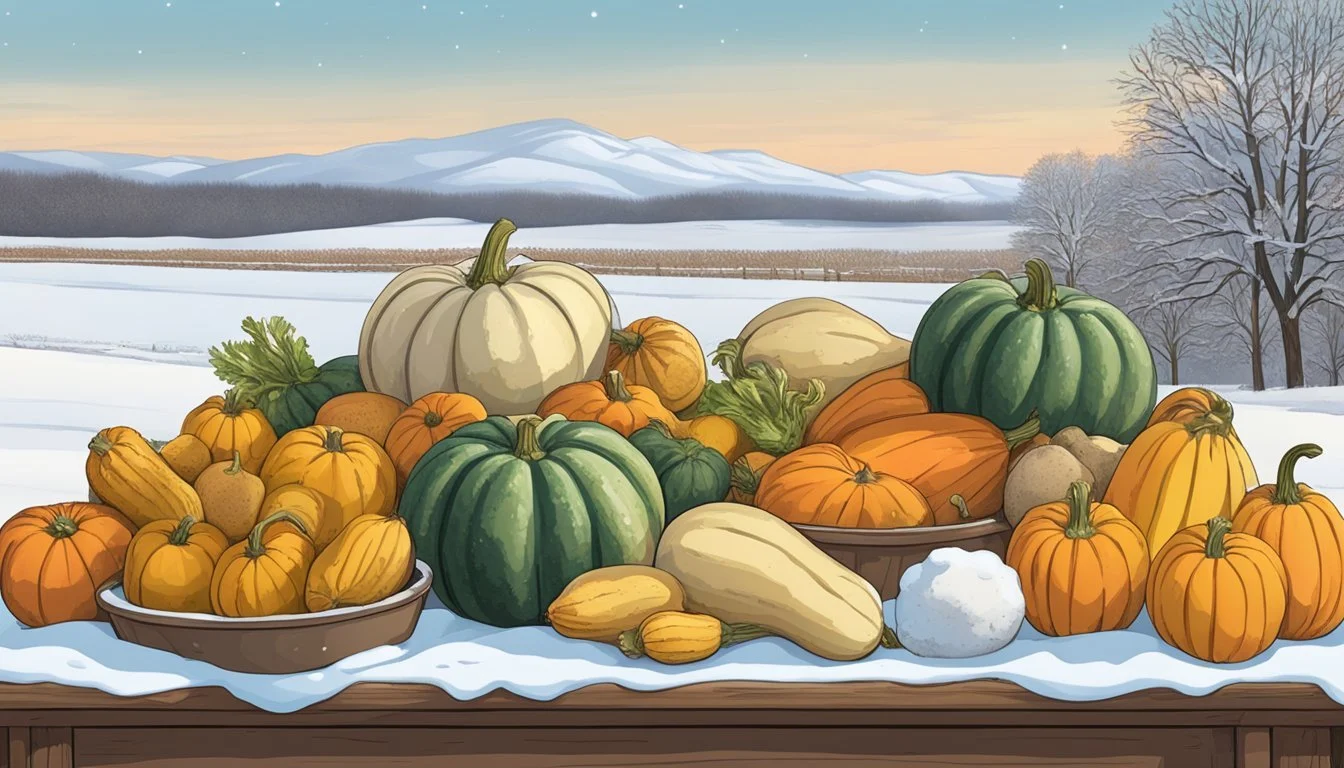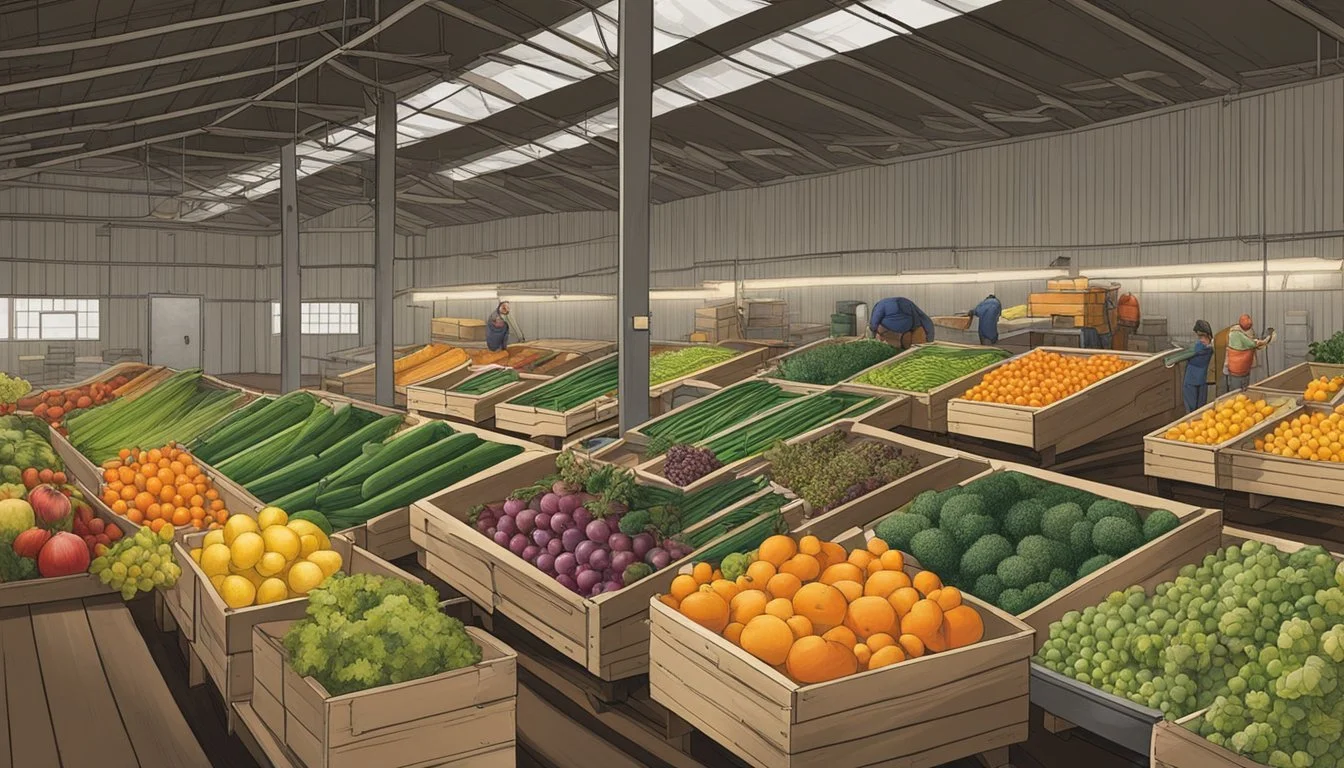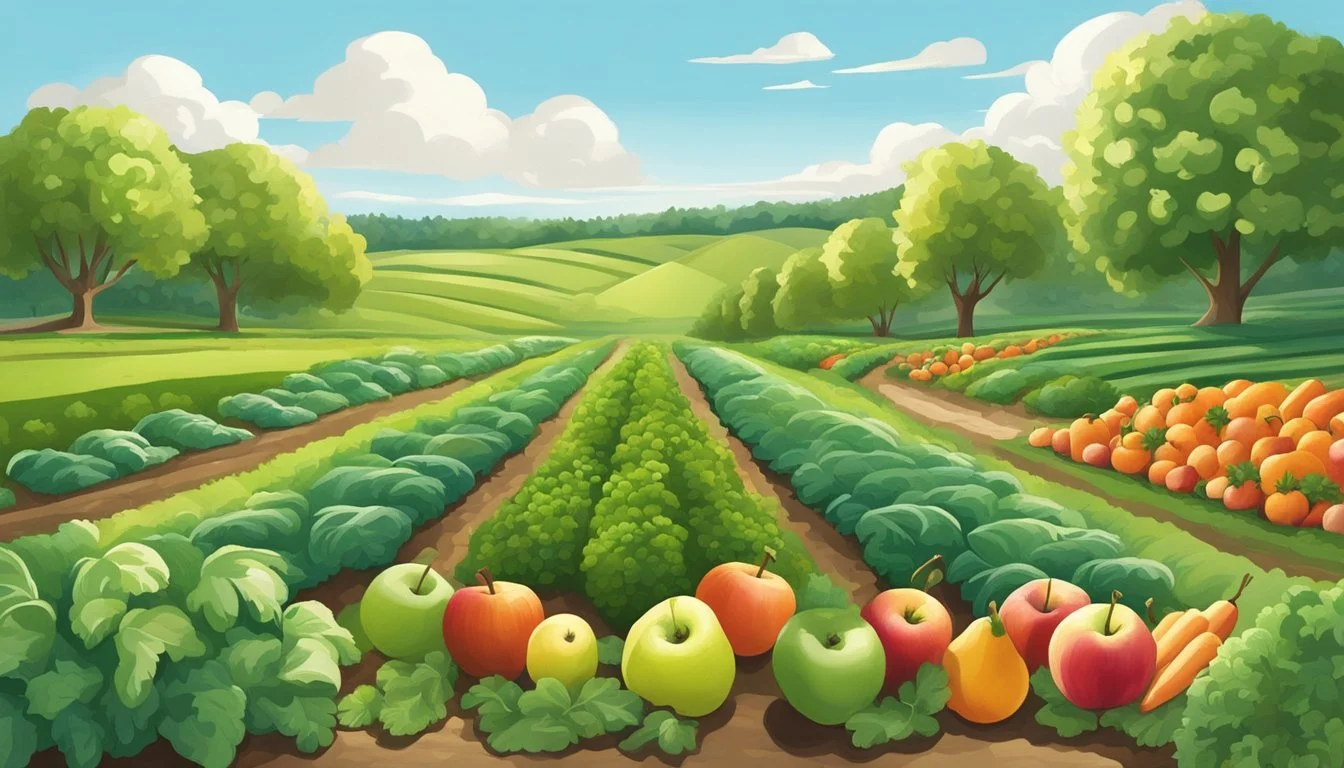Michigan Seasonal Fruit & Vegetables in February
A Guide to Local Produce
This Article is Part of our Michigan Seasonal Fruit & Veg Calendar
Michigan's climate, with its cold winters and warm summers, sets a rhythm for local produce availability that shifts distinctly with the seasons. February, being deep in the heart of winter, means fresh, locally-grown fruits and vegetables are more limited than during the bountiful warmer months. However, this does not imply a complete absence of seasonal produce. Root vegetables and storage crops often take the spotlight during this time, providing both sustenance and variety.
While the outdoor fields may lie fallow, this month is not without its fresh offerings. Greenhouses and indoor farming techniques enable the cultivation of certain products year-round. Moreover, winter is the time when stored crops, such as apples from the previous autumn's harvest, are still available and can be found in local markets and stores. These fruits and vegetables, stored at the peak of their freshness, continue to be a valuable and nutritious part of the diet during the colder months.
Overview of Michigan's Seasonal Produce in February
In February, Michigan's winter climate greatly influences the availability of fresh produce. Fruits are typically scarce as the cold temperatures do not favor the growth of most varieties. However, certain cold storage fruits remain available.
For vegetables, a few hardy types withstand the frost and are available during this time. Root vegetables, benefiting from their underground growth, are typically storable and accessible.
Below is a list of seasonal produce one might find in Michigan during the month of February:
Fruits:
Stored apples
Stored pears
Vegetables:
Beets (how long do beets last?)
Carrots
Potatoes
Winter squash
Onions
Many of these items are from storage and possibly from winter greenhouse cultivation, ensuring that despite the snow-covered landscape, Michiganders still have access to some fresh local produce. Most fresh greens and other produce that thrive in warmer conditions are not in season in Michigan during February.
Farmers markets and local stores might supplement their offerings with produce imported from other regions. However, the emphasis remains on stored yields from the previous harvest seasons, underscoring the value of sustainable practices such as cold storage and extending the availability of local produce through the winter months.
Seasonal Fruits Available in Michigan
In Michigan, February's chill still permeates the air, but certain fruits persevere, offering fresh flavors that can be enjoyed straight or in various culinary preparations. Markets continue to provide these hearty picks from the late harvest and storage to ensure consumers can enjoy local produce.
Apples
Michigan's apple orchards harvest many varieties that store well through winter. Storage apples often retain their flavor and firmness when kept in controlled conditions, making them ideal for eating fresh or using in baking recipes. Consumers can find types suitable for making sauce or enjoying as a crisp snack.
Pears
Pears are similar to apples in their storage capabilities, often available deep into the colder months. They offer a fresh and subtly sweet addition to salads or can be savored as a standalone treat. Their crisp texture is maintained when stored properly, ensuring the freshest eating experience.
Other Fruits
Although the variety is more limited in February, certain farm markets may still have stocks of other hardy fruits that have been preserved from the previous fall. These selections might include fruits like kiwis or persimmons, depending on the year’s harvest and the specific region within Michigan. It's always recommended to check with local farm markets for the most current availability.
Seasonal Vegetables Found in Michigan
During February in Michigan, the selection of fresh, local produce is more limited due to the cold climate. However, markets still offer a variety of hearty vegetables that are in season, suited to the winter environment.
Root Vegetables
Root vegetables thrive in Michigan's cooler temperatures and can be stored well into the winter months. The following are commonly found at local markets:
Potatoes: A staple in many households, they are versatile in cooking.
Carrots: Known for their sweetness, especially when harvested after a frost.
Beets: Rich in color and nutrients, beets are a popular choice for winter salads and side dishes.
Celery Root (Celeriac): Adds depth to soups and stews with its robust flavor and texture.
Leafy Greens
While the variety of leafy greens in February is not as extensive as in other seasons, there are still some hardy options available:
Kale: With a slightly sweet flavor post-frost, it remains a popular green.
Collard Greens (how long do collard greens last?): Known for their resilience in colder temperatures.
Other Vegetables
Some other vegetables remain in season during this time, providing additional options for fresh, local food:
Brussels Sprouts: Often found on the stalk, these are in their prime during the colder months.
Cabbage: A versatile vegetable that can be used in a variety of dishes from stews to slaws.
Cauliflower and Broccoli: While their season is waning, you may still find these at farm markets.
Squash: Includes varieties like butternut and acorn, providing a sweet and nutty flavor to winter meals.
Preparing and Storing Seasonal Produce
In February, the key to making the most of Michigan’s seasonal produce is employing proper storage and preservation techniques. This ensures that fresh fruits and vegetables maintain their quality and nutritional value until they are ready to be used in various recipes or consumed directly.
Canning and Preserving Techniques
When it comes to preservation, canning is a reliable method for extending the shelf life of produce.
Water Bath Canning: Suitable for high-acid fruits, it involves submerging jars in hot water and boiling them to create an airtight seal.
Pressure Canning: Necessary for low-acid vegetables, it uses a specialized pressure canner to achieve higher temperatures for safe preservation.
One must always follow updated, tested recipes and guidelines from reputable sources to ensure safety during the canning process. This is crucial to avoid foodborne illnesses associated with improperly canned food.
Tips for Fresh Storage
For fresh storage, it's vital to understand the specific requirements of each type of produce.
Light Sensitive Produce: Potatoes should be kept in a well-ventilated, dark place to prevent greening.
Cold Storage: Most root vegetables, such as turnips, benefit from refrigeration and should be stored in a crisp drawer to maintain freshness.
Room Temperature Storage: Onions and garlic prefer a cool, dry, and ventilated area but do not require refrigeration.
Ethylene Producers: Some fruits, like apples, produce ethylene gas and should be stored away from other fruits and vegetables to prevent premature ripening.
The key to successful fresh storage is to minimize moisture loss, prevent spoilage, and reduce the risk of ethylene gas affecting sensitive produce. Remember to wash fruits and vegetables just before use to preserve their freshness and reduce the risk of bacterial growth during storage.
Benefits of Seasonal Eating in Michigan
When Michigan residents choose seasonal eating, they enjoy foods at their peak of freshness. Seasonal produce is generally richer in fiber, vitamins, minerals, and antioxidants, which are essential for maintaining a healthy diet.
Cost-Effective: Seasonal fruits and vegetables grown in Michigan are often more affordable during their peak seasons. This is due to the lower costs of transportation and an abundant supply that meets demand.
Environmental Impact: Eating seasonally also supports the environment by reducing the carbon footprint associated with long-distance food transport.
Community Support: Locals who eat seasonally are likely supporting Michigan farmers. This strengthens the local economy and fosters community relationships.
Seasonal Winter Produce Nutritional Benefits Winter squash High in vitamins A and C, fiber Apples Antioxidants, fiber Root vegetables Minerals, vitamins, and antioxidants
Eating seasonally ensures that individuals consume produce that hasn't been stored for long periods, which can diminish nutritional value. Freshness equates to better taste and higher nutritional content, providing the body with essential nutrients required to support overall health.
Exploring Michigan Farmers Markets
In February, Michigan's farmers markets adapt to the chill of winter with a variety of cold-hardy produce and preserved goods. Visitors to the markets will discover a close-knit community of farmers and partners who remain eager to supply fresh and locally-sourced items despite the season's limitations.
Indoor Markets: Many farmers markets move indoors during the colder months, fostering a warm and inviting atmosphere for shoppers. These markets offer seasonal produce such as root vegetables and hardy greens that withstand Michigan's cold temperatures.
Seasonal Produce:
Root vegetables: carrots, potatoes
Hardy greens: kale, collards
Stored apples and winter squash
Value-Added Products: Shelves and stands at Michigan's farmers markets in February are also well-stocked with value-added products. These include:
Jams
Honey
Maple Syrup (how long does maple syrup last?)
Pickled Vegetables
Collaborative Efforts: Farmers markets often collaborate with local grocery stores and food distributors to ensure a stable supply of produce. These partnerships are crucial in extending the reach of locally produced food and supporting Michigan's agricultural economy during the off-season.
Community Engagement: The markets serve as community hubs, where locals and visitors alike can engage with growers, learn about winter farming techniques, and explore the seasonal bounty Michigan offers. They also provide an opportunity for farmers to share their knowledge about preserving and preparing winter produce, tying the community closer through food and education.
Through determination and adaptation to the colder climate, Michigan's farmers markets continue to thrive, offering a robust selection of produce and goods and sustaining the region’s commitment to fresh, local food, even in the depths of winter.
Where to Find Michigan Produce
In February, the quest for Michigan produce leads one to a variety of venues, each offering a selection of the state's seasonal bounty. Local farms provide a direct source, while many grocery stores feature a curated range of Michigan-grown fruits and vegetables.
Local Farms and Orchards
Local Farms often serve as the backbone of Michigan produce availability during the winter months. They may offer cold storage crops like apples and potatoes through their own farm stands or through Michigan Fresh initiatives. Resources such as the Michigan Farm Market & Agricultural Tourism Directory guide consumers to the closest farm-related businesses throughout the state.
Available Produce: Stored apples, root vegetables
Finding Farms: Visit Michigan Farm Market online for a comprehensive list
Grocery Stores and Markets
Grocery Stores in Michigan often partner with local farmers to provide fresh, regional produce even during the off-season months. Seasonal Availability Guides can assist in identifying which Michigan produce is currently available. For the freshest options, shoppers should seek out stores that advertise local sourcing practices or have Michigan Fresh signage.
Local Sections: Look for Michigan Fresh signs
Seasonal Guide: Check availability with the Michigan Harvest Calendar
By exploring these venues, residents and visitors can enjoy the flavors of Michigan, even when the landscape is blanketed in snow.
Michigan Produce Through the Seasons
Michigan's climate and fertile soil allow for a variety of crops to thrive throughout the year. The state takes pride in its seasonal produce, which includes an array of fruits and vegetables that locals and visitors eagerly anticipate.
Summer brings a peak in many of Michigan's specialty crops. During this time, farmers' markets burst with fresh produce. The warmth of the season allows for a bountiful harvest of certain fruits and vegetables, with September marking the transition period leading to autumn.
Here is a snapshot of what to expect from Michigan produce throughout the year:
Summer (June - August):
Fruits: Cherries, blueberries, peaches, nectarines, plums, and melons.
Vegetables: Sweet corn, tomatoes, cucumbers, zucchini, and green beans.
Autumn (September - November):
Fruits: Apples and pears.
Vegetables: Squash, pumpkins, and root vegetables like carrots and beets.
Although February is not the prime time for fresh produce in Michigan, greenhouses and storage crops still provide options such as root vegetables and some hardy greens.
The time of year directly influences the type of produce available. Each season has its signature fruits and vegetables that Michiganders look forward to. Understanding this cycle not only supports local agriculture but also ensures the freshest and most flavorful produce is enjoyed at its peak.
Supporting Michigan's Agricultural Economy
Michigan's economy significantly benefits from the state's diverse agricultural sector. With approximately 805,000 individuals employed in this sector, nearly 17 percent of the state’s total employment revolves around agriculture. Michigan farmers play a pivotal role in this economic landscape, bringing fresh, seasonal produce to the market, and sustaining the vitality of local businesses.
The state's success is bolstered by:
Federal funding, which aids specialty crop growers in Michigan. Such financial support ensures that farmers can continue to produce a variety of fruits, vegetables, tree nuts (how long do nuts last?), hops, nursery plants, and flowers.
Agriculture resources that offer details such as market locations, hours of operation, and contact information. This helps in connecting consumers directly with farmers and locally sourced produce.
The Market Maker network is noteworthy for creating connections between farmers, retailers, processors, and consumers:
Entity Role in Supporting Agriculture Farmers Provide fresh and seasonal produce to the market Retailers Sell local produce, enhancing the farm-to-table pipeline Grocery Stores Facilitate consumer access to Michigan produce Processors Add value to raw produce through various treatments Consumers Drive demand for local, fresh produce
Michigan farmers and the state as a whole have demonstrated resilience in adapting to climate-related challenges, ensuring a steady supply of produce. Farmer market operators are encouraged to enroll their business in local directories, which plays a significant role in maintaining the state’s economic health and securing Michigan's position in the national agricultural framework.
Online Resources for Michigan Seasonal Foods
Several online resources provide Michiganders with valuable information about seasonal foods throughout the year. These resources are particularly useful in February when fresh local produce selection tends to be more limited.
What's in Season - Michigan Fresh offers a comprehensive guide for consumers looking to find local markets and farm stand locations using their current location or a provided zip code. Individuals can access information about available fruits and vegetables as well as market details like hours of operation.
Website: Access through the 'College of Agriculture and Natural Resources' webpages.
Features: Current season produce, farm locations, market hours.
Michigan State University Extension provides guidance on enjoying locally produced food even in the winter. They emphasize the availability of local meats, cheeses, honey, and more which are accessible despite the season.
Website: MSU Extension's page features articles and tips for seasonal eating.
Facebook Page: Regular updates on local food initiatives and educational content.
The Seasonal Eating Chart helps users plan their meals around what is fresh at Michigan's farmers markets or local grocery stores. Emphasizing nutrient-rich and flavorful local produce, the chart aids in identifying the seasonal availability of fruits and vegetables.
Website: Find the Seasonal Eating Chart on sites dedicated to Michigan produce.
Features: Visual guide to produce availability.
Additionally, the Michigan Harvest Calendar acts as a guide for the availability of fruits and vegetables, adjusting for changes due to weather conditions.
Website: Often shared on local food-related websites and blogs.
Features: Crop harvest dates, U-Pick seasons, weather impact notices.
Consumers looking for tailored information on what is available locally can turn to these resources to inform their purchasing decisions and support Michigan food producers, even in the colder months.











